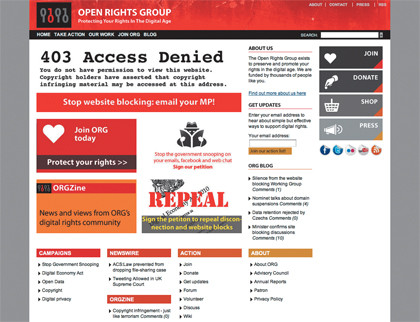
The UK has very strict laws about what you can and can't do with other people's data. If you intercept it so that you can see what it is, deliberately delay its transmission or prevent it from reaching its destination altogether, you can be fined or thrown in prison.
Unfortunately, that only applies if the data is written down and sent through the post. If it's electronic and you're an ISP, you can filter, delay and even block data all day long.
Our connections are already monitored and filtered to prevent us from stumbling across horrific and illegal images, but there's growing pressure for ISPs to do more.
As we'll discover, ISPs could soon be stopping us viewing perfectly legitimate content, with secret blacklists making some sites disappear.
The way we consume content is changing. Increasingly, news comes not in newsprint, but via RSS feeds, video services and smartphone apps. Radio has turned into something we stream or download, we're more likely to watch TV via iPlayer or 4oD than tune in at a particular time to watch a specific programme, and most of us would rather download a film than visit one of the few remaining video shops.
That means most of the information you access comes down a single pipe: your home broadband connection. We assume that ISPs don't meddle with our connections, but is that true? Could ISPs filter what we see and do online, censor websites and prioritise some kinds of content over others?
They already do. Many ISPs throttle traffic like the BBC's iPlayer at peak periods, and BitTorrent users will be well aware that ISPs don't treat all kinds of data equally.
Get daily insight, inspiration and deals in your inbox
Sign up for breaking news, reviews, opinion, top tech deals, and more.
As Trefor Davies, Chief Technical Officer of Timico and council member of the UK Internet Service Providers Association, explains: "traffic management varies from ISP to ISP, with some not doing it and others managing the heck out of users' traffic.
It's a commercial issue. If someone wants to pay a rock-bottom price for a broadband service then their ISP is probably not going to want to spend lots of money providing lots of bandwidth capacity."
Traffic management
In practice, this sort of traffic management usually means that bandwidth hogs like BitTorrent are restricted to prevent other services like Skype from becoming unusable.
"Most - if not all - ISPs try to give priority to time-critical applications such as voice, gaming and so on," Davies explains. "You usually hear complaints about traffic management when people are hitting torrents hard and the torrent, which is a very inefficient use of a network, slows to a dribble," he adds.
Could the same technology be used for ill - for example, by crippling competitors to give ISPs' own services a helping hand?

In March, Culture Minister Ed Vaizey told reporters the three principles he believes should guide the way ISPs act. "The first is that users should be able to access all legal content," he said. "Second, there should be no discrimination against content providers on the basis of commercial rivalry. And finally, traffic management policies should be clear and transparent."
Vaizey was commenting on the launch of the Broadband Stakeholders Group's new code, to which BSkyB, BT, O2, TalkTalk, Three, Virgin Media and Vodafone are signatories. However, the code isn't really about traffic management - it's about how ISPs communicate details of their traffic management to consumers.
The BSG isn't promising that ISPs won't penalise specific services; it's just promising that if they do, they'll tell you about it "in a common format". The principle that ISPs shouldn't discriminate on the basis of commercial rivalry is open to interpretation. The big ISPs aren't just carriers - they're service and content providers too. For example, TalkTalk sells domestic telephone services.
Would managing Skype or other voice over IP applications be seen as commercial rivalry? BT and Virgin Media are planning to launch new music services. Would throttling Spotify, Amazon's Cloud Player or the forthcoming cloud-based iTunes be commercial rivalry? Many ISPs offer video on demand. Would it be deemed discrimination on the basis of commercial rivalry if they managed H.264 video streams, or iTunes downloads, or BitTorrent?
We regulate old media - for example, we regulate broadcasting so that one company can't own too many TV stations, radio stations and newspapers simultaneously - and today, much of the media we consume is delivered via our broadband connections.
It's conceivable that traffic management could be used by ISPs to abuse their power, so should we regulate new media to prevent that? Does the concept of net neutrality - where data is treated identically no matter where it comes from - need to be enshrined in law?
The government's answer is no.
Neutral on neutrality
Speaking at the FT World Telecoms Conference in November, Ed Vaizey said that: "a lightly regulated internet is good for business, good for the economy and good for people [...] The government is no fan of regulation and we should only intervene when it is clearly necessary to deliver important benefits for consumers."
Peter Bradwell is a campaigner with the Open Rights Group. "Net neutrality does encompass some familiar questions of media plurality," he says, "and this is of vital importance to the future of the internet. The question is, how do you ensure that it remains a fair marketplace in which incumbents are consistently challenged by new entrants, and that regardless of stature or wealth, people can distribute their ideas, information and services to the world? Our belief is that allowing ISPs to make deals with content providers - deals that privilege incumbents' data - could put that at risk."

Michael Jarvis, head of retail media relations at BT, argues that ISPs would quickly be punished by customers for any such deals.
"No ISP has any market power in the UK, and therefore none have the power to shape or view what we see and do online. If any ISP tried to do so and their customers didn't like it, they could easily move to a competing ISP," he says.
"BT cannot answer for other ISPs, but we have four key public commitments: BT broadband customers will be able to access any internet-based service or application; no legal service or application will be blocked on these products; content and application providers will not be charged for basic internet conveyance; and we will provide wholly transparent information to customers on our traffi c management practices in line with industry best practice."
Our ISPs aren't in the censorship business, but if the government gets its way, that may soon change.